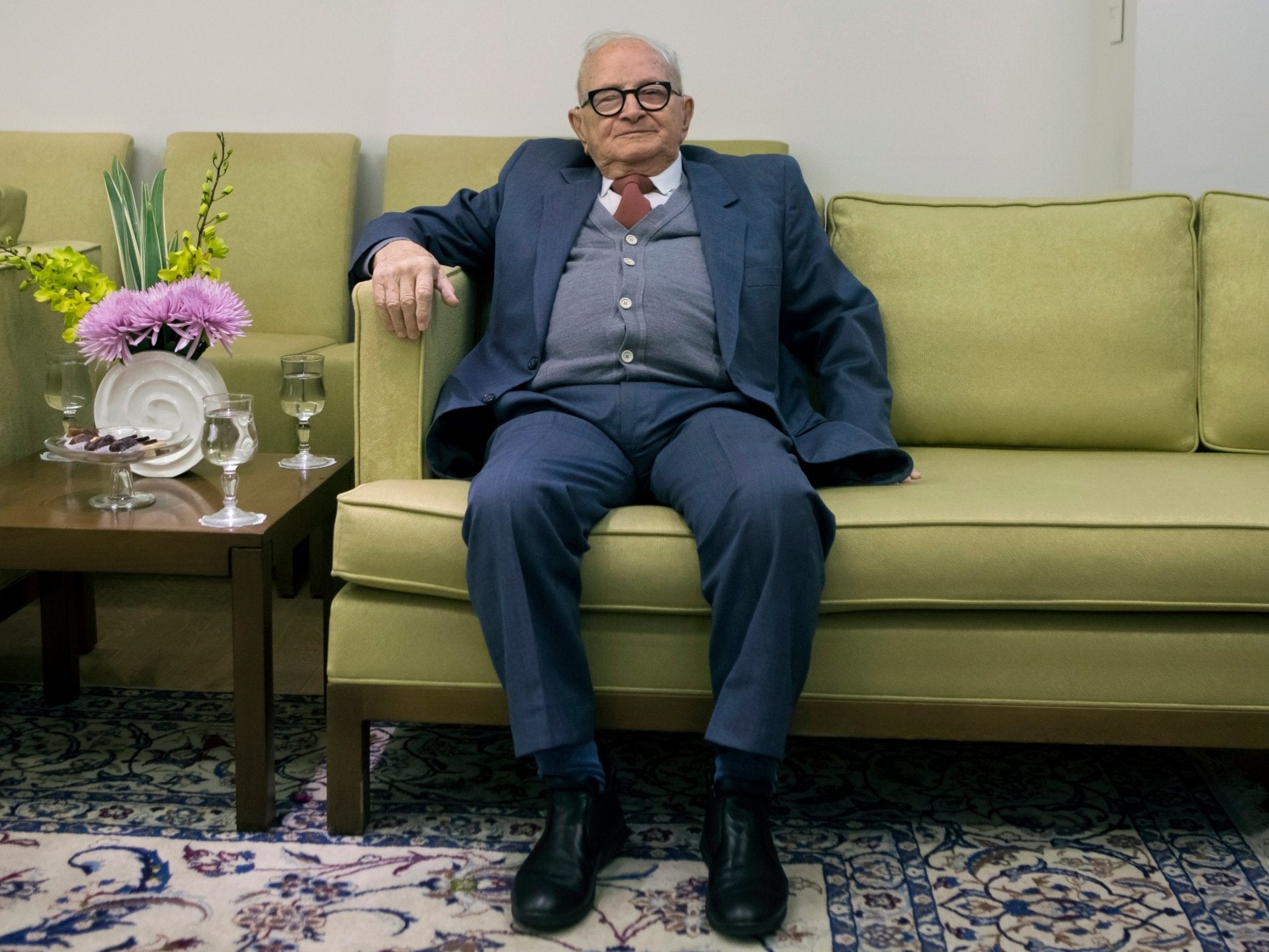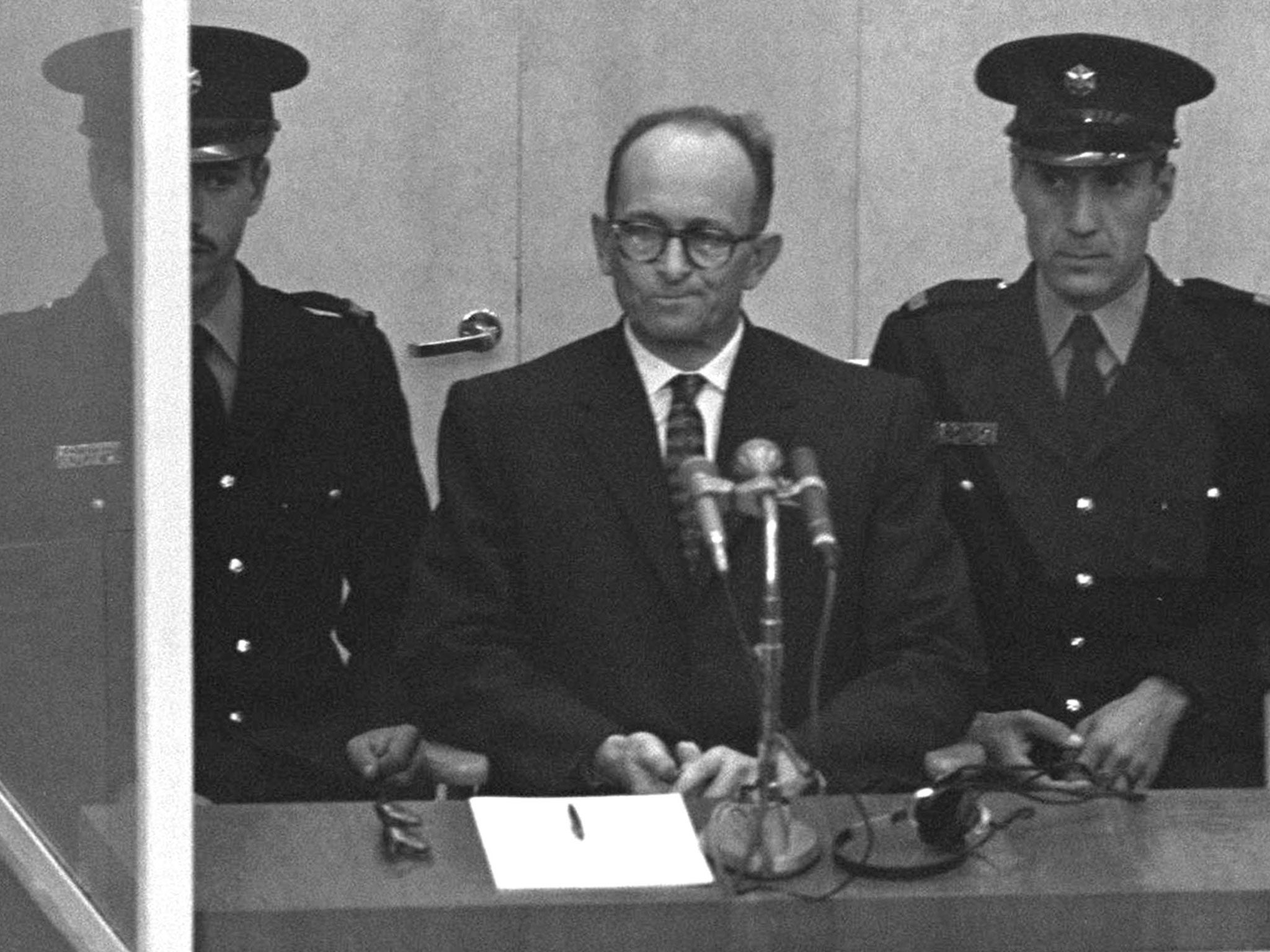Rafi Eitan: Israeli intelligence chief who kidnapped Adolf Eichmann in Argentina and brought him to justice
Known as ‘Rafi the Stinker’ to British rulers of Palestine after he made his way through sewers to blow up a radar station, he was with his Nazi prey until the end

Your support helps us to tell the story
From reproductive rights to climate change to Big Tech, The Independent is on the ground when the story is developing. Whether it's investigating the financials of Elon Musk's pro-Trump PAC or producing our latest documentary, 'The A Word', which shines a light on the American women fighting for reproductive rights, we know how important it is to parse out the facts from the messaging.
At such a critical moment in US history, we need reporters on the ground. Your donation allows us to keep sending journalists to speak to both sides of the story.
The Independent is trusted by Americans across the entire political spectrum. And unlike many other quality news outlets, we choose not to lock Americans out of our reporting and analysis with paywalls. We believe quality journalism should be available to everyone, paid for by those who can afford it.
Your support makes all the difference.Shortly after 8pm on 11 May 1960, a slight man stepped off a bus in suburban Buenos Aires. He seemed weary, ready to be home and looked bewildered when a car pulled up alongside him.
The man was Adolf Eichmann, chief architect of Hitler’s “final solution”, and one of the most-wanted Nazis in the world. Inside the car were agents of the Mossad, the Israeli intelligence agency. Their commander was Rafi Eitan, who became known as one of his country’s greatest, if most controversial, spies.
In 1999, the Welsh author Gordon Thomas published a book, Gideon’s Spies: The Secret History of the Mossad.
He had interviewed Eitan, who recalled the encounter: “I grabbed him by the neck with such force I could see his eyes bulge. A little tighter and I would have choked him to death.”
The Mossad team moved Eichmann to a safe house where they held him for days without speaking. “Keeping silent was more than an operational necessity,” said Eitan.
“We did not want to show Eichmann how nervous we all were. That would have given him hope. And hope makes a desperate person dangerous. I needed him to be as helpless as my own people were when he had sent them in train loads to the death camps.”

To spirit Eichmann to Israel, the team gave him a bottle of whiskey, disguised him as a drunken El Al flight attendant and shepherded him onto a plane. He stood trial in Jerusalem, was convicted of his role in the murder of 6 million Jews during the Holocaust and in 1962 was executed by hanging.
The trial, chronicled in philosopher and political theorist Hannah Arendt’s 1963 classic Eichmann in Jerusalem: A Report on the Banality of Evil, brought international attention to Nazi atrocities. Argentina protested that Eichmann’s capture was a violation of the country’s sovereignty, but in Israel and elsewhere the operation was greeted as a masterwork of espionage whose end abundantly justified its means.
The capture of Eichmann was likely Eitan’s most celebrated undertaking. He added that it was also one of his easiest. His most contentious action came two decades later, when he became the handler of Jonathan Pollard, a civilian intelligence analyst for the US navy who pleaded guilty in 1986 to selling classified intelligence to Israel. Pollard was sentenced to life in prison and was freed on parole in 2015.

The case – which represented the only instance of an American given a life sentence for spying for an ally – was the subject of intense controversy on both sides of the international partnership.
In the United States, some observers feared that the actions of Pollard, who was Jewish, would fuel questions often raised with antisemitic innuendo about the national allegiance of American Jews. In Israel, critics denounced Eitan for jeopardising one of Israel’s key alliances.
The Israeli government announced that Eitan was removed from his intelligence post after the affair. He said that it had been a mistake to cooperate with Pollard but insisted that he had acted with “permission and authority”.
“All intelligence work is a partnership with crime,” he told an Israeli television interviewer years later. “Morals are put aside.”
Rafael Hantman was born in 1926, on the Ein Harod kibbutz in what was then the British mandate of Palestine, where his parents had emigrated from Russia several years earlier. He later adopted the more Hebrew surname Eitan.
Eitan’s father was a farmer and a poet, according to The Jerusalem Post, and his mother was a social activist. She took her young son to see a film about a female spy in the First World War, prompting the boy to announce: “I want to be a spy like Mata Hari.”
He was 12 when he joined the Haganah, the paramilitary force that grew into the Israel Defence Forces after the creation of the state of Israel in 1948. As a member of the elite Palmach unit, he helped shepherd Jewish refugees into Palestine. In one operation he swam through sewers to blow up a British radar station, earning the nickname Rafi the Stinker.
Eitan, who studied at the London School of Economics, entered intelligence in part because of wounds and hearing loss that he sustained in the Israeli war for independence. He rose through the ranks of Shin Bet, the Israeli equivalent of the FBI, before joining the Mossad, where he became chief of operations.
His other operations reportedly included intercepting Soviet spies in the 1950s, disrupting the sale of German armaments to Egypt and planning the 1981 Israeli attack on Iraq’s Osirak nuclear reactor.
Eitan served as a terrorism adviser to prime ministers Menachem Begin and Yitzhak Shamir. After the Pollard case, he was made chairman of the state-owned company Israel Chemicals. In the mid-2000s, he entered politics as head of the Pensioners’ Party, known as Gil, and served briefly as pensioners’ affairs minister.
He is survived by his wife Miriam Peled and their three children.
In a dramatic coda to the most dramatic moment of Eitan’s work, he was present in the execution chamber when Eichmann was put to death.
“Your time will come to follow me, Jew,” he recalled the Nazi saying.
“Not today, Adolf, not today,” Mr Eitan replied.
“Next moment the trap opened,” Eitan recounted in Gideon’s Spies. “Eichmann gave a little choking sound. There was the smell of his bowel moving, then just the sound of the stretched rope. A very satisfying sound.”
Rafi Eitan, Israeli intelligence chief, born 23 November 1926, died 23 March 2019
© Washington Post
Join our commenting forum
Join thought-provoking conversations, follow other Independent readers and see their replies
Comments